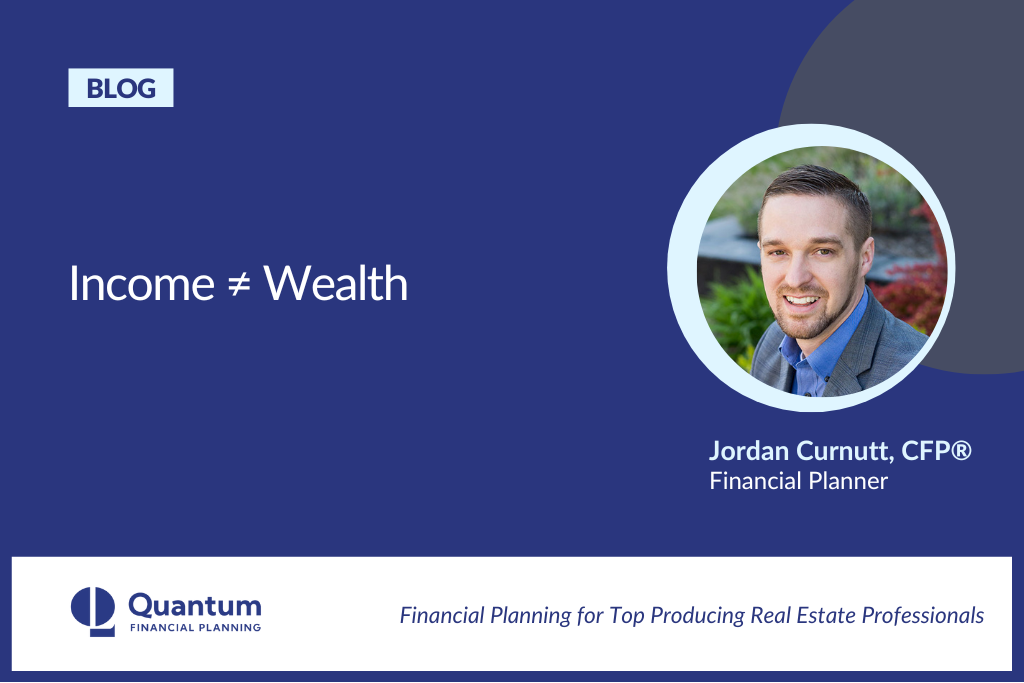If you’re like most real estate agents I speak with, you know how much you made last year—but do you know your wealth?
You see, while income and wealth have the potential to be closely related, they are two fundamentally different things.
What is the Difference Between Income and Wealth?
Income is the generation of dollars
Whether by working in your real estate business or from a passive asset that creates income without requiring your time, income is an inflow of dollars to you from a source of value you create or own.
You will notice the word asset popped up there, and that’s where the two definitions collide.
At some point in the future, you will probably want to stop relying on your time working in your real estate business for income. But to maintain the lifestyle you have become accustomed to, you must replace that income with assets. And those assets must generate an income equal to or greater than what your lifestyle requires.
This is where wealth comes into play.
Wealth is a calculation that puts a value on your assets and then subtracts out your liabilities
There are a handful of names you will hear for defining wealth, but whether you call it your balance sheet or your net worth, at the end of the day you add up your assets and subtract out your liabilities.
The remaining balance is your wealth.
Notice it is entirely possible to have a phenomenal income—let’s say $750,000 of GCI in a year—and at the same time have a negative net worth.
That is, you own more debts than you do assets.
In fact, a lack of adequate wealth to maintain your lifestyle into retirement is a struggle many top producers have found themselves in.
After speaking with many agents in this situation, I have found that in cases of significant income and a lack of corresponding wealth, it almost always boils down to the same issue: the need for a systematized process.
How to Covert Income to Wealth
The best way to convert income to wealth is to implement a systematized process
Let’s not pretend your income has the same stability as our friends in the corporate world.
You must contend with both seasonality and the ebbs and flows of the real estate market cycle.
For this reason, your process for converting income to wealth cannot be the same as a bank executive who simply contributes 15% of their paycheck every two weeks and receives a generous match from corporate.
While this strategy has worked for decades in their world, leaving executives with similar incomes to you with a multimillion-dollar retirement nest egg to rely on, this systematized process does not come built into your business as it does with a corporate salary.
No, for you to have a systematized process that achieves the same financial success, you must proactively create your own customized cash management plan.
You have similar and debatably better tools available, but the burden is on you to implement them
And this is where I most often see agents get stuck.
It isn’t that they do not have the income or even the desire to save and accumulate assets for later in life, it’s that they quite simply do not know where to begin. And how would they?
Implementing your own solo 401(k) plan comes with more intricacies than simply shooting an email to HR to increase your retirement contributions on your next paycheck.
Plus, once dollars have been contributed to a retirement account, you don’t want to touch them until after age 59 ½ to avoid heavy taxes and penalties. But what if you need access to money in the next slow real estate market cycle?
All valid but solvable problems with a properly structured and customized cash management plan.
So, while I won’t argue it is easy, it is certainly necessary to recognize this fact: While you have built a massively successful real estate business that generates a great income for you and your family, if you want to build wealth, you can’t stop there.
Remember, just earning a high GCI isn’t enough to build wealth—it’s how you deploy your GCI that determines your financial success.
Ready to start converting your income to wealth?
Schedule a meeting with a real estate agent-specific financial planner.

